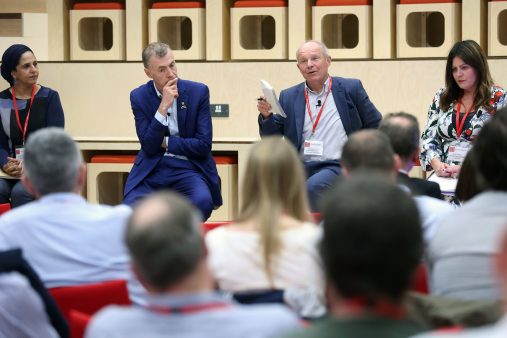Challenges and opportunities for SPARK
28 June 2022
sbarc|spark celebrated its official opening on Thursday 9th June. Special guests from the worlds of social science research-led innovation, politics, the third sector and government attended the ‘celebration of society’s super-lab.’ In this, the first of a series of blogs* from the event’s four panellists, we hear from Professor John Goddard OBE, Emeritus Professor of Regional Development Studies at Newcastle University and Professor of Universities and Cities at the University of Birmingham

He discusses the challenges and opportunities of place-based and community-led strategies for addressing major societal challenges – how sbarcIspark can create a community driven by expertise, creativity, curiosity, and entrepreneurship to strengthen the relationship between research, impact and engagement.
“I come at this question from experience as Deputy Vice Chancellor (DVC) at Newcastle and as vice-chair of the Civic University Commission
My particular area of expertise is city and regional development, but I have come to realise there are three separate knowledge domains covering territorial development, higher education, and research. Straddling them is not easy.
The key challenge for me is how to bring together the knowledge demand/needs side in civil society with the knowledge supply side in the academy – outside in and inside out
The opportunity arises in terms of the gain to the academy and the community that can come through a knowledge co-production process linking research to societal innovation.
For this to happen the academy has to recognise that there are insights in business and civil society globally and locally that can help move scientific frontiers forward, especially in addressing cross disciplinary grand challenges.
Critical to this is a more nuanced understanding of the process of innovation. The academy has to move on from the linear model and recognise that in the words of an insightful EC review that “innovation is not a Roman Aqueduct but a muddy pond …it requires all actors, corporate, academic, civic, and political.”
More specifically, many technological innovations in a digital age need widespread societal and organisational innovation in terms of new ways of working in business and delivering services in the public and voluntary sectors
And this is where the social sciences come in with their expertise in the functioning of society
And within the social sciences those disciplines with an interest in place can play a key role
I say this because most grand challenges have both local and global dimensions. Through a place lens the interrelated nature of the UN Sustainable Development Goals cannot be ignored – place in the round can shape the life chances of individuals and the performance of firms.
In this respect a university as a key anchor institution can play a leading role tying down the global in the local. It can use its convening power to bring together all key actors critical to the future development of its place – not just in but of it. The University OF Cardiff
The community and voluntary sector not just business and local government has to be part of this process. This requires building long term trust relationships between universities and a very diverse group of small organisations with limited research capacity and moving on from short term externally funded projects in which researchers dive in and then exit.
This points to the need for long term funding to develop a cadre of boundary spanning actors who understand the drivers on both sides and support for the whole local innovation ecosystem so as to maximise collective impact. But as well-resourced agents, universities have to demonstrate that they “have skin in the game “
Cardiff has demonstrated this by investing in SPARK to kick start a long journey of institutional change inside and outside of the University
I say ‘long journey’ because for any university the incentive structure for the academy in relation to research relevant to society remains linear and siloed. For example, between disciplines and also between teaching and research – including the role of students in knowledge exchange, in new enterprise formation and providing graduate skills to support the uptake of research
Having said this the strength of the traditional university is the opportunity it provides for creative and entrepreneurial activity at the level of the individual academic. But at the same time, it has to recognise that addressing grand challenges requires institutional heft as well individual action.
The trick is to combine top-down strategic direction and bottom-up entrepreneurial behaviour in a loose tight structure. One way SPARK might do this is by initiating a long-term Cardiff Futures exercise mobilising academics across the university to work with stakeholders to assess the implications of their research for the future of the city region and Wales.”
Professor John Goddard – john.goddard@newcastle.ac.uk
- Further blogs featuring Fozia Irfan, Director of Children and Young People at BBC Children in Need; Adam Price, Leader, Plaid Cymru and Kellie Beirne, Director of Cardiff Capital Region will follow in the weeks ahead.